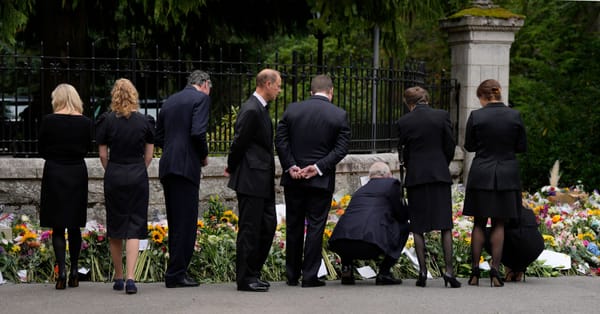The funeral of Winston Churchill in 1965 turned out to be the burial of the British Empire. The funeral of Queen Elizabeth next week will probably be the obsequies of the United Kingdom. On the freezing January day when Churchill was buried after a triumphant, ancient, and unrepeatable procession through London, the millions who had watched it on tiny black-and-white televisions understood that they had seen much more than the passing of a very great and very old man. With him gone, we were just a country, in which small men scurried about under tall arches and high vaults built by and for greater figures than they could hope to be, and for vaster purposes than they could hope to pursue. I often wonder how the British foreign secretary copes with the vastness of his actual physical office, in which you could hold a tennis match or a modest promenade concert. Yet navies don’t move at his command, and I suspect he struggles to get some of the larger powers in the world to take his telephone calls.
You can still watch this long, lush moment in which decline is wrapped in glory but remains evident. It takes some finding, but the misty, monochrome recording of the Churchill procession and the ceremony can still be located. Watching it many years later—I first saw it on a TV screen on a high shelf in my boarding-school dining hall—I was struck by how physically distant it seemed, though the cityscape of ceremonial, political, and official London hasn’t changed all that much. It is the spirit that has altered. The country in those days still had some scraps of its former grandeur and of the stoical austerity which had made the grandeur possible. The hollow, almost gaunt faces of the soldiers who carried the old warrior’s coffin up the steps of St. Paul’s Cathedral would be hard to find anywhere in Britain now. Life has changed too much. It is sweeter and softer and fatter than we could then have imagined. The dress and the slang and the carriage of the crowds on those chilly streets would have been more recognizable to a Londoner of the 1920s than to a Londoner of today. I suspect that the ceremony next Monday will have a similar power to jolt us out of ancient dreams. And that, as in 1965, we will not realize the depth, length, breadth, and height of our loss until the closing hymn dies away on the Westminster Abbey air, and the last trumpets blow.
Queen Elizabeth knew very well that the empire was done for. She didn’t inherit her father’s title of king-emperor, and she devoted a great deal of time to nurturing the empire’s unsatisfactory successor, the Commonwealth, in the hope that it might through gentle influence replace some of the armed might, majesty, dominion, and power that the British Empire had wielded. But it was a bit like Lewis Carroll’s Snark, a creature whose nature was impossible to establish and whose very existence is hard to prove. What unites it? What does it actually do? Do its members have a single important thing they all share in common? I was once told by a serving foreign secretary that its existence greatly aided the sales of familiar British-branded goods, such as disinfectants, but I am not even sure that we make such things anymore. Some of its member states are far from being exemplary law-governed polities. At least one member, Mozambique, was never part of the British Empire in the first place. Many are republics that don’t accept the British monarch as head of state. Several obviously yearn to be republics but have been prevented by good manners towards the late Queen from taking this step. If this now ends, a peculiar new danger threatens the former seat of empire.
Let us say that Australia, a country regarded by many British people as a sunnier version of their own home, decides to become a republic. This is likely to make the issue a real one in the home islands. The United Kingdom is already nothing of the sort. After the revolutionary Blair government pursued Welsh and Scottish devolution, and chose the policy of appeasing the Irish Republican Army in Northern Ireland, politics in much of these islands changed irrevocably. Almost everything that happens in Scotland is now connected to the nationalist desire to leave the union with England. Disenchantment with supposed English rule is common in Wales. Irish republicanism is probably the strongest single political force, in the shape of Sinn Fein, in Northern Ireland.
